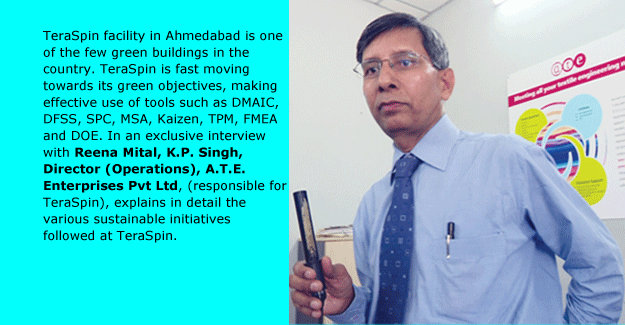TeraSpin Is Investing In Product Development And Increasing Manufacturing Capacity
TeraSpin Is Investing In Product Development And Increasing Manufacturing Capacity

How is the market response to TeraSpin products?
It's been two years since TeraSpin launched its products and I am very happy to say that our products have been well accepted in the market - both by OEMs and in replacement market across the globe. The products are based on SKF technology and are continuously improved upon. TeraSpin products are sold to more than 10 countries. We are getting several repeat orders, which is an indication of product satisfaction. This gives us a lot of strength and confidence and we hope to grow this business significantly.
What differentiates TeraSpin from its competitors?
TeraSpin products are known for reliability. The precision manufacturing process is aimed to have longer working life while reducing variations between bobbin. Our new developments are actually based on customer's feedback/experience. We can simply say that they are designed by our customers and manufactured by us.
Tell us about the 'Smart' cradle that you have developed.
'Smart' cradle is one of the 'smart' innovations of TeraSpin. Experience shows that with ordinary cradles there is a variation in apron nip to front roller nip distance. The Smart cradle (awaiting patent) addresses the problem due to fluctuations in apron lengths or elasticity by compensating it without moving the nose of the cradle. It offers constant tension on the aprons without changing the fibre guiding area (R distance). It helps maintain exact and equal distance between apron nip and front roller nip. It is made of robust fibreglass reinforced polymer suitable for tough mill conditions. The design is such that it allows smooth rotation of apron, leading to longer apron life. The aprons are easy to mount and remove. Extensive field trials confirm improvement in IPI and micro IPI by 10-15%; depending on yarn count. We strongly believe that the Smart cradle will revolutionise the ring spinning technology.
How do you perceive the trends in the spinning sector?
I see a good trend emerging for the Indian spinning sector. Every year, for the last 3-4 years, the industry has been adding sizeable capacity. Maybe some of it is obsolete, but a lot of modern capacities exist too. Future growth will depend primarily on the international market. China is facing a lot of issues. Their capacities are old too, and Chinese spinning facilities are not able to match the productivity and speeds of the Indian factories. Spinning yarn in China is going to be quite difficult. And if this continues, then Indian spinning sector is in a good situation and we may continue to grow. At present, India faces an over-capacity, but these cycles keep happening. I don't see any reason to worry. I do not see China, or Bangladesh or Pakistan increasing spinning capacity. The last few months have been bad. But this will all balance out as the medium to long term prospects look promising.
What are your latest machine offerings for spinners?
There have been a lot of developments lately. I am proud to say that Truetzschler India was able to install 830 carding machines in the calendar year 2014. That is a significant benchmark. The company is coming up with a new model very soon, which will be displayed during Shanghaitex in June. We are getting very good orders from the spinning sector. Truetzschler's combing machines have been very well received by the market. Truetzschler has begun manufacturing the Toftomat for blends, at its India facility which is now its global manufacturing hub. This machine is also doing very well in India. Moreover, Indian manufacturing ensures that costs are kept significantly down, resulting in an increase in the overall market size for the machine. So we offer the best quality and are also aware of the price that the customers can offer.
What are the trends in spinning technologies?
We see a good potential in compact yarn spinning. We have been looking for a technology supplier in this genre. And were fortunate to locate one - DeChang, from Southern China. The company has state-of-the-art manufacturing facility. We have now brought this product in India. Initial trials have been very successful, with most of the customers placing repeat orders. These are good quality compact attachment, at affordable price with A.T.E.s commitment of support and service. We are storing spares and accessories to avoid the hassles of imports.
Would you say that textile engineering manufacturing will pick up in the country?
I think so. Truetzschler India's production unit is one of the biggest for the group. Also Saurer is setting up manufacturing in India. Companies that initially went to China are now coming to India, due to our many advantages - a strong technical and engineering base, skilled people, and competitive manufacturing costs compared to China. Also with the "Make in India" pitch gaining momentum in India, manufacturing in India will surely get a further boost.



 textileexcellence
textileexcellence 







